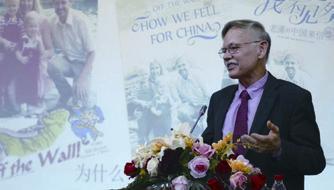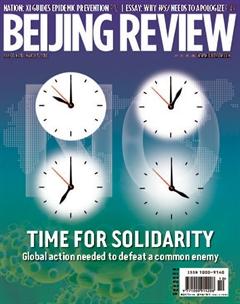A Moving Response
By Yan Wei

The world should be grateful to China because no other nation could have coped with the novel coronavirus epidemic with the decisiveness and courage that China has shown, said William N. Brown, a professor with Xiamen University.
“As soon as the government was indeed certain, it reacted quickly and decisively—even sacrificially,” Brown said. “Chinas actions are costing the nation billions of dollars, but the nation and the people accept this stoically as the price of protecting not only China but the rest of the world as well.”
In a recent letter to the Foreign Languages Press (FLP), Brown said he found it ironic that the Western media keep comparing this virus to the severe acute respiratory syndrome (SARS) that broke out in China in 2003, but they dont talk about the swine fl u of 2009, and how it took many months for Western governments to take it seriously.
China, however, had isolated the genome of this new virus and shared it with the world within two weeks, Brown noted.
Brown began teaching at the School of Management, Xiamen University, in the southeast province of Fujian in the late 1980s. His book Off the Wall: How We Fell for China, a compilation of his letters written over 30 years to family and friends in the United States published by the Beijing-based FLP, hit the headlines when he received a congratulatory message from President Xi Jinping in early 2019.
The following is an excerpt from the letter he sent to the FLP:
Weve been following the news very carefully from California, and have been so impressed, and deeply moved, by Chinas response—not just the governments response but also that of the people. Many of my Chinese friends have sent me messages encouraging me, even though I am not facing the virus. A girl in Xiamen wrote, “Im in 14 days quarantine but no problem! I can use my phone to order fresh food sent right to my door, and I can stay in contact with friends via social media or study online. We know the quarantine and restrictions are for our safety.”
The world should be grateful that this happened in China and not anywhere else, because no other nations government or people could have coped with this challenge with the decisiveness and courage that China has shown.
I find it ironic that the Western media keep comparing this virus to SARS, but they dont talk about the swine flu of 2009, and how it took many months for Western governments to take it seriously. They also dont talk about the Middle East respiratory syndrome, which Western governments also responded to very slowly, even though the fatality rate was over 40 percent. Yet China, within two weeks, had already isolated the genome of this new virus and shared it with the world.
As to the short delay in announcing this to the public, it was reasonable. Just as you should never shout “Fire!” in a crowded room, we should not create panic among the public by announcing an epidemic until it is certain. This is just common sense. But as soon as the government was indeed certain, it reacted quickly and decisively—even sacrificially. Chinas actions are costing the nation billions of dollars, but the nation and the people accept this stoically as the price of protecting not only China but the rest of the world as well.
But it is no surprise to me that Chinas medical professionals can handle this so well. Many people, including Chinese, would be surprised to learn that some Western experts said that even in the 1970s, Chinas medical care for average people, both rural and urban, was better than that in the U.S. In 1979, Dr. Victor Sidel spoke before the U.S. Government and angered quite a few leaders when he gave statistics on how “poor”China did a better job of meeting its peoples health needs than “rich” America.
Dr. Sidel visited China three times in the 1970s. He shocked the U.S. government leaders when he showed them that the infant mortality in New York City was twice as high as that in Shanghai for white babies—and three times as high for non-white babies. He also showed how Chinese did a better job at immunization than Americans. Dr. Sidel said: “China is a poor country… Despite its low level of technology and its poverty, China has made incredible advances in the past 30 years in the health status of its people.”

Dr. Sidel also compared China to other developing Asian countries:
“Wherever one looks in China one sees a fundamentally healthy people. If you have traveled to other poor countries of Asia, you have some feeling for the different way people on the streets look and the poor health status that very different picture refl ects.”
Dr. Sidel then surprised his audience by saying, “Part of this change in health in China in the course of one generation has nothing whatever to do with medicine. It has to do with what people eat, the houses in which they live, the way in which theyre clothed, and the ways in which they live together.” This medical doctor then shocked his audience by saying, “Food distribution is a far more important determinant of health than is medical care.”
In speaking of Chinas better food, housing, clothing and society, Dr. Sidel was speaking of the Chinese dream, although it was decades before anyone had actually called it a dream, or dared to believe it could truly become a reality for China [and, thanks to the Belt and Road Initiative, to other nations as well].
Some may remember 2020 for the virus, but history will remember 2020 as the year that China achieved Xis goal of eradicating absolute poverty. No other nation in history has ever dared to even voice such a goal, much less to act upon it.
All people, after all, are dreamers, and hope for a better life of peace and prosperity for their descendants.
When a U.S. government leader expressed doubt that Dr. Sidels dream of better medical care in the U.S. could become reality, Dr. Sidel replied, “The achievement of worthwhile goals, as you personally know, is never easy. That must not stop us from trying.”

